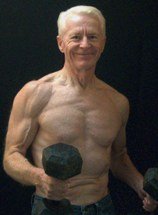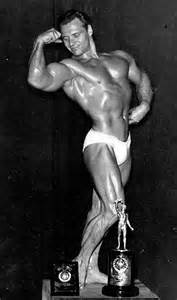Hi

January 1, 2014
In this newsletter . . .
Who cares what the
old bodybuilders did?
Are your New Years Resolutions real?
Who cares what the old bodybuilders did?
It’s a reasonable question. Here it is the first day of the year 2014. Do we really need to know about how some guys worked-out back in 1950, or even earlier than that? Ancient history, right? Surely training methods have improved since the practices of the previous mid-century. Well, no. The fact is, I suppose a little surprisingly, that they have not.Oh, there have been a few valid refinements: e.g. don’t do pull-ups or lat-machine pull-downs behind your neck. Pull the bar to the front, it’s advised nowadays. That kind of thing. But mostly the basics of strength and muscle building are what they’ve always been. Unfortunately, that much truth wouldn't sell muscle magazines at the newsstands.
In the last newsletter, I called attention to the great Steve Reeves. I pointed out that his page on my website is always highly popular, though he passed away 14 years ago.
 Along with Reeves, other old-timers such as Hilligenn and LaLanne are also admired, and questions arise about their training, too. But when it comes to perennially strong subscriber interest, I would have say that it is John Grimek who is second only to Reeves.
Along with Reeves, other old-timers such as Hilligenn and LaLanne are also admired, and questions arise about their training, too. But when it comes to perennially strong subscriber interest, I would have say that it is John Grimek who is second only to Reeves.
Why would that be?
Take a look. That is Grimek, just to your left on the page. His history is unusual in that he reached the highest level in both Olympic weightlifting and as a (reluctant) bodybuilder. I should stop here though. I don’t want to ruin a good story by giving away too much of it in the newsletter. If you'd like to know more about this true icon of weight-training, discover it here at: John Grimek.
Men of that era – LaLanne, Hilligenn, Reeves, Grimek, and many others – had differing goals and approaches. One common denominator, though, was that steroids were not available to them. Yet look at what they accomplished drug free and using old-school basic methods. Most, too, were not merely posers. They were all-around athletic people.
If you like the newsletter, we're making it easy to share it . . .



Are your New Year's Resolutions real?
A couple of years ago, my wife told me the homily at church on New Year’s Day was about making resolutions, and the difference between true resolve and wishful thinking. Briefly, a serious resolution must be specific and, of course, truly committed to; otherwise, it is just wishful thinking.As she explained the homily in more detail, I was reminded of Bill Phillips’ formula for resolve and goal setting in his best selling book, Body for Life. He advised . . .
- Setting a realistic, attainable goal.
- Writing it down.
- Setting a deadline for reaching that goal.
- Setting weekly short-term goals that incrementally get you to your long-term goal.
I have a similar formula in my beginners’ book, Gray Iron: A Fitness Guide for Senior Men and Women.” Here is an excerpt from it . . .
“Goals
“Keeping a fitness notebook provides order and efficiency to your workouts and your life. A simple three-ring binder and some index tabs work fine. Keep it simple, but keep it current.
“Title for first section ‘Goals.’ On the first page, write out what you want to accomplish, and when you intend to do it. ‘I will lose 100 lbs. of fat in 90 days and win a weightlifting contest,’ is ridiculous (wishful thinking). But, ‘I will lose 20 lbs. over the next 90 days,’ for example, is a realistic attainable goal for a determined person. Be sure to set an exact date you intend to reach your goal. Now, you’ve really got something to work toward.
“The second step is to set short-term goals. Don’t overlook this part. You reach major objectives by incrementally reaching smaller ones. Many people set new short-term goals at the beginning of each week (‘I will lose 2 lbs. by next Sunday,’ for example). If you have trouble staying focused, setting new goals every week is a good way to stay on track. At the end of each week you can say ‘I did it!’ and feel a well-deserved sense of accomplishment.
“Some people even tape their goals list on a mirror or wall so they see them every day. If it helps, do it. Whenever you reach a short-term goal, check it off the list, and write in the actual date you reached it. Incrementally, you are closing in on your long-term goal. Once you reach a long-term goal, set a new one. Keep repeating the process. Structured goal setting is a ‘secret’ of many successful people.”
Without a plan, what many people call a resolution is nothing more than a wish. Read again the excerpt (above) from the book. That is a way to make a genuine resolution, and how to reach an actual goal.
So now it’s New Year’s Day. Do you plan on making a resolution about your fitness (or anything else)? OK, we all know that most people's New Years resolutions gradually fade away, never fulfilled. But don’t let that discourage you. You don't have to be "most people." The genuinely serious, determined ones do experience success. With a realistic goal, a plan, and resolve, amazing things can and do happen.
Apply the foregoing formula and watch it work its magic.
Happy New Year!
P.S. Discover all the workout information you’ll need to make a serious fitness resolution right here.


Newsletter Policy
The Gray Iron Fitness Newsletter is a free publication sent twice monthly to subscribers. The purpose is to provide honest and realistic fitness information for people age 50 and above.
I have never been paid or received compensation of any kind to write a positive review or endorse a product. If I say that I personally use a product or service, it is because I find value in it and have paid for it with my own money.
Like newspapers, magazines and television, this newsletter and my web site contain advertising and marketing links. Naturally, I am compensated for these.
The newsletter and web site provide information to help users establish and maintain a fitness lifestyle. But fitness information is not the same as fitness advice, which is the application of exercise and dietary practices to an individual's specific circumstances. Therefore, always consult with your physician for assurance that fitness information, and your interpretation of it, is appropriate for you.Your comments and questions are always appreciated. Simply click on the "Reply" bottom.
Sincerely,
Logan Franklin
The Gray Iron Fitness Newsletter
www.senior-exercise-central.com



